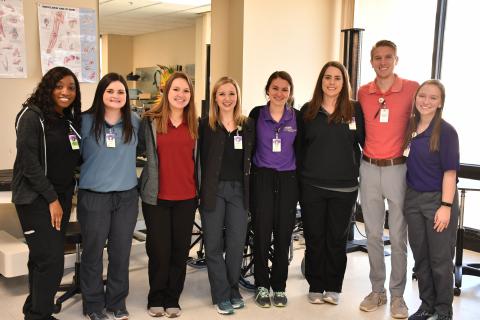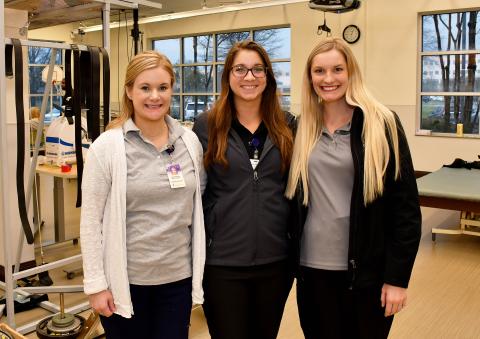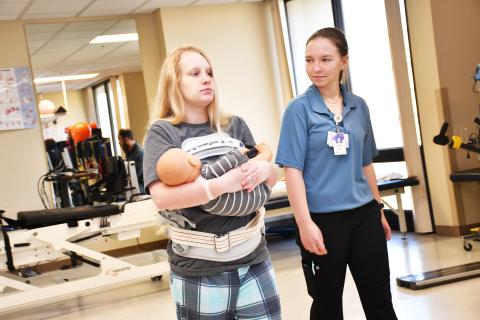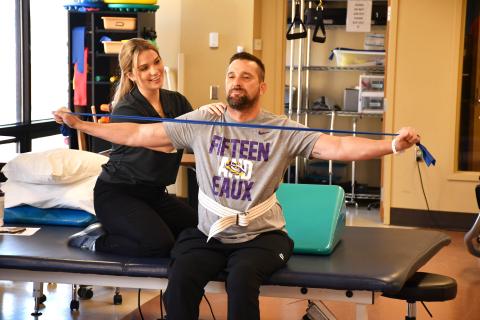
Investing in the future: Methodist Rehabilitation Center provides therapy students singular experience with advanced technology, facilities and staff




While studying to be a physical therapist at the University of Mississippi Medical Center’s School of Health-Related Professions, Annie Campbell heard nothing but good things about Methodist Rehabilitation Center’s student program.
“I heard over and over again that it was such a great clinical experience,” Campbell said.
So she says she jumped at the chance to enroll. And now, after 12 weeks working with and learning from the staff of MRC’s spinal cord injury program, she says it’s more than lived up to the hype.
“It’s a much more team-based approach than I’ve seen in other settings I’ve had a chance to work in so far,” Campbell said. “I loved how involved the entire staff got with the students, that the doctors would come and talk to me about my patients. And also the occupational therapy staff that I worked with would come to me to discuss strategies as well.”
The program offers the necessary clinical rotations for students finishing their degrees in physical therapy, occupational therapy and speech therapy. Students are paired with an MRC therapist in their discipline who has at least a year of on-the-job experience.
“It’s an opportunity for them to transition from book learning and labs with their fellow students to actual hands-on learning with patients, under the mentorship of a licensed therapist,” said MRC education director Marcia King, who organizes the program.
Located on the UMMC campus in Jackson, MRC is a private nonprofit that is Mississippi’s only freestanding rehabilitation hospital. While MRC remains independent, it is affiliated with UMMC in the areas of neuroscience research, clinical care and education.
Naturally, many of the program’s students come from UMMC. But MRC has hosted students from schools across the southeast and as far away as the University of Iowa and Duke University.
“We provide these students an enormous amount of exposure to, not only clinical excellence, but also our advanced technology, our research department, our outpatient services—across the entire continuum of care we offer at Methodist Rehab,” said MRC therapy director Suzy Gonzales.
Students can get hands-on with equipment like the LokomatPro FreeD, the ErigoPro and the ZeroG Gait and Balance System. The Lokomat is a treadmill that uses a harness system to partially unload a patient’s weight, while a robotic device attached to the hips, knees and ankles guides the legs in a proper stepping motion. The ErigoPro is a neuro-robotic device that combines three therapies in one—a tilt table, functional electrical stimulation (FES) and robotic leg movements. And the ZeroG is a harness system attached to an overhead track that supports a patient’s body weight and provides a safe, controlled environment for practicing various therapy tasks.
Students also have the option to participate in research projects, many of which involve the aforementioned equipment. And they have the opportunity to interact with the staff of MRC’s two outpatient therapy clinics in Flowood and Ridgeland.
At the Flowood facility, they can also familiarize themselves with the field of wheelchair and seating solutions at MRC’s Assistive Technology Clinic or get some insight into post-amputation care at Methodist Orthotics & Prosthetics.
Methodist O&P is a division of MRC with six locations across the state and one in Monroe, La. They also take an active role in MRC’s education outreach.
“We provide lectures to both physical and occupational therapy programs in the state,” said Methodist O&P director Chris Wallace. “The goal is to educate them on what orthotic and prosthetic components are, how they function in a general sense, and what to look for and address when they encounter a patient with O&P needs.”
King says that MRC’s facilities aren’t the only reason the program is sought-after, however. Mainly, it’s about the people.
“Most of all, these students get the opportunity to work with our therapy staff with advanced skills and certifications,” King said.
MRC has the largest number of neuro clinical specialists (NCS) in one facility in the state, a distinction for individuals with advanced clinical knowledge in neurological physical therapy. MRC also employs five of the eight seating and mobility specialists (SMS) in the state, which recognizes demonstrated competence in wheelchair assessment.
Campbell’s mentor, physical therapist Chris McGuffey, is a NCS and SMS. He also did his clinical rotation with MRC’s student program before he graduated and joined the MRC staff. Currently, MRC employs several therapists who took part in the student program.
“The training of students is really about investing in the future of our hospital,” Gonzales said. “Our part in the education process is to provide quality care to our patients while providing students with a solid training experience to develop them into excellent clinicians.”
King says the program benefits the hospital in other ways as well.
“The students come from a variety of programs, which can bring different perspectives that challenge our clinicians,” King said. “It’s an exchange of ideas between student and mentor.”
Madison Colley, a UMMC student, has been with the program for two months working with occupational therapist Melissa Kay McCombs.
“She’s more detail-oriented than me, so we have worked together very well,” she said. “She’s helped me to learn to slow down and really think about what I’m doing.”
And the MRC experience has also emphasized the virtue of Colley’s chosen profession.
“The staff is very proactive and hardworking, and really care about the patients and their success,” she said. “Being here has definitely helped my skills as a future occupational therapist. I’m seeing firsthand patients come in with major deficits and how much they improve by the time they leave. It’s truly awesome to see.”
